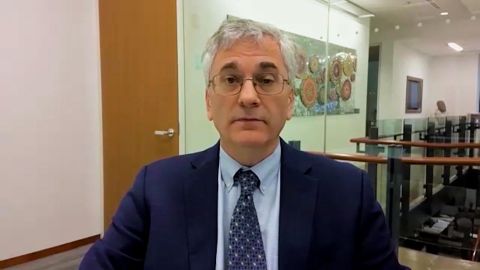JUDY WOODRUFF: We turn now to Dallas, where two programs are trying to shift the conversation
around juvenile justice.
One is bringing young people into the kitchen.
The other aims to address trauma through art.
John Yang has that story, as part of our occasional series Chasing the Dream on poverty and opportunity
in America.
JOHN YANG: It's a Friday night in downtown Dallas and Cafe Momentum is buzzing.
In the dining room, waiters thread their way between tables.
In the kitchen, workers churn out dishes.
Watching over it all, executive chef and founder Chad Houser.
CHAD HOUSER, Founder, Cafe Momentum: Say, you know, we will have a table for you in
about 15 minutes.
JOHN YANG: But Cafe Momentum is far from an ordinary restaurant.
All the waiters and a lot of the kitchen staff have recently been released from juvenile
detention in Dallas county.
They're here on year-long paid internships.
WOMAN: You guys come in, you guys helping us.
We feed you guys, you guys go home happy.
JOHN YANG: Eighteen-year-old De'Monica Dean, who goes by Dee, first got in trouble in 2014
for stealing her sister's car.
At Cafe Momentum, she does a bit of everything.
DE'MONICA DEAN, Cafe Momentum: Most people didn't get a second chance.
And the fact that I'm able to get a second chance, I got to do it right.
CHAD HOUSER: The most important thing that we do in this physical restaurant is prove
to our kids and to the community that these young men and young women can and will rise
to whatever level of expectation is set for them.
JOHN YANG: Across town, another program with a similar mission, but a very different approach.
This is Creative Solutions, a seven-week summer arts program for Dallas juveniles on probation.
Byron Sanders is the president and CEO of Big Thought, the nonprofit that runs Creative
Solutions.
BYRON SANDERS, President and CEO, Big Thought: What's needed is, yes, work force skills,
job skills, academics.
But you can't do that if you haven't been able to go through and deal with the hurt,
deal with the pain, deal with the lack of trust, deal with the things that have been
barriers to empathy, deal with own self-worth.
Arts allows us to do that.
JOHN YANG: In Texas, more than 60 percent of juvenile offenders end up in trouble again
within three years of probation or release.
For Creative Solutions, that number is just 13 percent, for Cafe Momentum, 15 percent.
Here in Dallas and across Texas, juvenile justice officials are rethinking the system.
Since reforms in 2007, the number of young offenders sent to big state-run detention
centers has plummeted.
The focus has shifted to local programs closer to home.
University of Texas at Dallas criminologist Alex Piquero.
ALEX PIQUERO, University of Texas at Dallas: People were really concerned at the beginning
of that, because, oh, crime's going to skyrocket.
People -- all these kids are going to be on the street.
You know, you're letting out all these kids who should be locked up forever.
And we didn't see that, in fact, just the opposite.
And that I think is what we call the Texas miracle.
JOHN YANG: Darryl Beatty directs the Dallas County Juvenile Department.
DARRYL BEATTY, Executive Director, Dallas County Juvenile Department: We, as a department,
you know, we have our funds that we can do things with.
But it's really the community and community programs that are vital to provide the necessary
services that sometimes we as a department can't.
JOHN YANG: Hours before Cafe Momentum opens, interns sit down for family dinner, a staple
in restaurants.
Here, though, they usually begin with an activity led by a staff member.
Today, it's a game of telephone to show the importance of communication.
The seeds of Cafe Momentum were planted more than a decade ago, when Houser taught eight
kids in the Dallas juvenile justice system how to make ice cream.
CHAD HOUSER: That experience was very humbling for me.
I learned that the difference between their lives and my life at their age was literally
the difference in choices that were made for them and made for me before any of us were
ever born.
JOHN YANG: He launched a series of pop-up dinners and then, in 2015, opened Cafe Momentum.
The program has worked with more than 750 kids, each, Houser says, with their own unique
starting line.
MAR'TWAN DARDEN, Cafe Momentum: Welcome to Cafe Momentum.
(LAUGHTER)
JOHN YANG: Server Mar'twan Darden, now 20, first got caught shoplifting when he was just
13.
The last time he was locked up, he came to a realization.
MAR'TWAN DARDEN: I just remember staring at the ceiling, and just thinking, like, do you
want to live like this for the rest of your life?
And, no.
I was like, no, man.
I have got to get it together.
So when I got released, I made a promise to myself, like, you know, I'm going to value
my freedom.
JOHN YANG: Creative Solutions has worked with some 14,000 Dallas youth over almost a quarter-century,
and, since 2007, Southern Methodist University has hosted the summer program, where participants
choose between creating art for an exhibit or performing in front of an audience.
Sasha Davis is Creative Solutions' theater director.
SASHA DAVIS, Creative Solutions: They will come.
Oftentimes, there's a brick wall, not ready to quite say or experience whatever that thing
is in their past or whatever led them to this moment, and then they will take a poetry class
and write it all down, and then something clicks.
JOHN YANG: Frankie Zuniga had been incarcerated for more than a year when he entered Creative
Solutions, very reluctantly.
At first, he didn't trust the instructors.
FRANKIE ZUNIGA, Creative Solutions: In my mind, they're like, oh, you're just here to
get a paycheck.
And, yes, I don't care.
But over time, I'm like, dang, like, they do care.
I learned to open up, and then they're like, here, just try this, do this dance move, try
- - write this, perform.
And, little by little, it, like, helped me open up.
JOHN YANG: Zuniga, who now works at Big Thought, recently got his associate's degree, and wants
to be a nurse or a physical therapist.
While both Big Thought's Sanders and Cafe Momentum's Houser are focusing on getting
juvenile offenders back on track, they say their ultimate goal is keeping young people
out of trouble in the first place.
CHAD HOUSER: I have got to continue to push as hard as I can, to push that conversation
further, so that we as a whole country, are talking about these injustices that we are
forcing on a population of children.
I think about that every day.
BYRON SANDERS: We had one of our alumni ask a really strong question, which is actually
guiding a lot of our work moving forward.
He said, "Why did I have to go to jail before I got something that would change my life?"
That's the question we should all be asking ourselves.
And then we need to act.
JOHN YANG: Action that may start with a work of art or a good meal.
For the "PBS NewsHour," I'm John Yang in Dallas.



